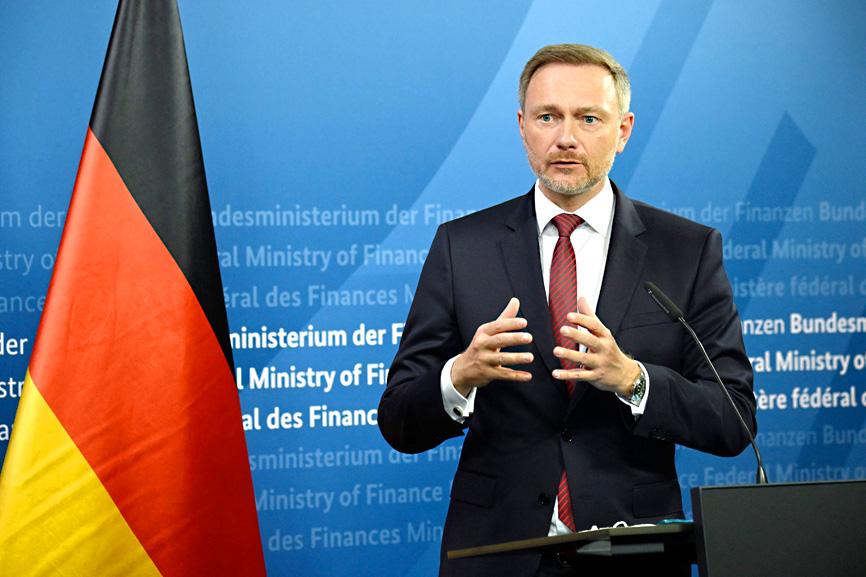Germany needs to “diversify” its export destinations, German Minister of Finance Christian Lindner said yesterday, warning that Europe’s top economy is too reliant on trade with China.
“My concern is that ... we have a strong economic inter-connectedness with China,” Lindner said in an interview with Die Zeit weekly.
“We need to diversify international relations, including when it comes to our exports,” he said.

Photo: AFP
Tensions between China and the West are on the rise following Beijing’s refusal to condemn Russia’s invasion of Ukraine, whereas the EU and the US have imposed sweeping sanctions on Moscow.
Germany’s government came to power in December last year vowing “dialogue and toughness” in its dealings with China, with a focus on human rights after the commerce-driven pragmatism of previous administrations.
“Perhaps the time has come when we should preferentially do business with those who are not only trading partners, but also want to be partners in values,” Lindner said.
China was again Germany’s largest trading partner last year, with the countries exchanging goods worth 245 billion euros (US$268 billion).
A survey by the Ifo economic institute published late last month found that 46 percent of German manufacturers source “key inputs” from China.
Of those companies, “almost one in two” plans to reduce the imports, it said.
Even before the Ukraine conflict, the EU’s relations with Beijing had been battered by disagreements, including over China’s trade coercion of Lithuania over Taiwan and treatment of the Uighur minority.
However, experts say that the bloc remains reluctant to go too far in pressuring Beijing at a time when soaring energy prices and inflation are already causing major economic pain.
Separately, European businesses operating in China are struggling to cope with COVID-19 lockdowns that are hurting production and threatening supply chains.
The EU Chamber of Commerce in China at a media event yesterday warned of disrupted output.
Chamber president Joerg Wuttke said that erratic enforcement of China’s “zero COVID-19” rules is making it difficult for firms to adjust operations.
Additional reporting by Bloomberg

SEEKING CLARITY: Washington should not adopt measures that create uncertainties for ‘existing semiconductor investments,’ TSMC said referring to its US$165 billion in the US Taiwan Semiconductor Manufacturing Co (TSMC, 台積電) told the US that any future tariffs on Taiwanese semiconductors could reduce demand for chips and derail its pledge to increase its investment in Arizona. “New import restrictions could jeopardize current US leadership in the competitive technology industry and create uncertainties for many committed semiconductor capital projects in the US, including TSMC Arizona’s significant investment plan in Phoenix,” the chipmaker wrote in a letter to the US Department of Commerce. TSMC issued the warning in response to a solicitation for comments by the department on a possible tariff on semiconductor imports by US President Donald Trump’s

The government has launched a three-pronged strategy to attract local and international talent, aiming to position Taiwan as a new global hub following Nvidia Corp’s announcement that it has chosen Taipei as the site of its Taiwan headquarters. Nvidia cofounder and CEO Jensen Huang (黃仁勳) on Monday last week announced during his keynote speech at the Computex trade show in Taipei that the Nvidia Constellation, the company’s planned Taiwan headquarters, would be located in the Beitou-Shilin Technology Park (北投士林科技園區) in Taipei. Huang’s decision to establish a base in Taiwan is “primarily due to Taiwan’s talent pool and its strength in the semiconductor

An earnings report from semiconductor giant and artificial intelligence (AI) bellwether Nvidia Corp takes center stage for Wall Street this week, as stocks hit a speed bump of worries over US federal deficits driving up Treasury yields. US equities pulled back last week after a torrid rally, as investors turned their attention to tax and spending legislation poised to swell the US government’s US$36 trillion in debt. Long-dated US Treasury yields rose amid the fiscal worries, with the 30-year yield topping 5 percent and hitting its highest level since late 2023. Stocks were dealt another blow on Friday when US President Donald

UNCERTAINTY: Investors remain worried that trade negotiations with Washington could go poorly, given Trump’s inconsistency on tariffs in his second term, experts said The consumer confidence index this month fell for a ninth consecutive month to its lowest level in 13 months, as global trade uncertainties and tariff risks cloud Taiwan’s economic outlook, a survey released yesterday by National Central University found. The biggest decline came from the timing for stock investments, which plunged 11.82 points to 26.82, underscoring bleak investor confidence, it said. “Although the TAIEX reclaimed the 21,000-point mark after the US and China agreed to bury the hatchet for 90 days, investors remain worried that the situation would turn sour later,” said Dachrahn Wu (吳大任), director of the university’s Research Center for